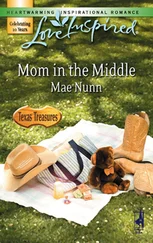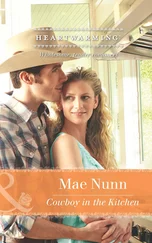“So you’re really going.”
Ike nodded.
Gordon nodded too, squinted down his nose at Ike like he wanted a good look at him, then took a drink from the bottle. “Well, maybe it’s time,” he said. “You’re out of school, and you’ve got a trade. Hell, that’s more than I had when I was your age. Kind of figured you might stick with those bikes, though. Jerry says he’s never seen a kid pick up tools the way you have. What do you want me to tell him?”
“I’ll be back.”
Gordon laughed and took another drink. The laughter had a “like hell you will” ring to it. “Last place I saw your old lady was right here. You know that?” Gordon asked, then tore up a bit of dirt with the toe of his boot while Ike shook his head and mentally added his mother to the list of those swallowed by that patch of sunlight. “Yeah. Said she would be back for you kids in the fall. Shit, I took one look at that candy ass she was leavin’ with and knew that was a lie.”
Ike had been five years old that summer. He’d never known his father at all, just some guy his mother had lived with off and on for a couple of years.
“I’m not your old man,” Gordon said. “And I’ve never tried to be, but I’ve given you kids a roof, and it’s still here if you want to come back. But I wouldn’t get my hopes up about that sister of yours. She was wild, Ike, like her old lady. She could’ve gotten herself into anything. You understand? Don’t stick your neck out too far looking for her.”
Ike waited. He was not used to Gordon taking an interest in what he did. There had been a time when that was what he wanted. Now? He guessed maybe that time had passed. Still, Gordon had come. The trouble was, Ike could think of nothing to say. He watched Gordon take another drink, and then looked toward that place where the lights of King City barely managed to put a pale frosting on a piece of desert sky.
As he waited he thought about what Gordon had said, about Ellen being wild, like her old lady had been wild, and he thought about their mother. He could not remember much about her now. There was one picture—what he was certain was the only one of all of them, together. They were seated on the steps of his grandmother’s house, himself on one side, Ellen on the other, Ellen with one stick of an arm bent over their mother’s shoulders, the other raised and extended to give the bird to the camera, all of them squinting into the sun so that it was hard to see their faces. What he mainly remembered about the picture—aside from Ellen flipping off Gordon—was his mother’s hair, thick and black, alive in the sunlight. He seemed to remember that she was given to sitting for long periods of time, brushing it in rhythmic strokes, or arranging it with a pair of combs that were made of ivory and carved into the shapes of long slender alligators. And that summer, before she left, she had given the combs to Ellen—the only things she had ever given either of them, as far as he could remember. The combs had become one of Ellen’s prize possessions, even up until the time she left. And it seemed to him now that she had worn them that day as well, that they had gone with her into the heat waves. He shut his eyes to remember and the beer made him dizzy. He was suddenly sorry that he had begun dredging for memories. It was generally a depressing exercise and he should have known better. Others came now, but he fought them off. He focused his attention on the gravel between his feet and waited for the hum of a Greyhound to fill the silence.
He was still waiting when he became aware that one more person had joined them on the street. Gordon must have noticed as well because he turned once to look back over his shoulder toward that place where the streetlamp began to fail among the oaks. She would not step into the light but remained among the shadows, and there was something about seeing her there, in just that way, that made him think of them all together—his grandmother, his mother, his sister. For there had been times when he had seen both his mother and his sister in the old woman’s face, in the certain way she sometimes turned her head, in the line of her jaw. The likeness was generally very fleeting, like a shadow passing over barren ground. Just what had made it barren—time, sickness—he could not say. He supposed that getting religion had not helped.
She waited until the headlights of the bus were swimming among the stunted branches before coming forward—small and stiff, like she had been whittled out of something hard, like she belonged with the wind-bent trees that had been planted there to mark the edge of town. And her voice, when she raised it, was like a weapon, the jagged edge of a broken bottle. The voice seemed to cut easily through the cool air, the deep drone of the engines. But Ike was not inclined to stay and listen. He moved quickly up the steps and then back along the narrow aisle, sucking down great lungfuls of stale recycled air, avoiding the eyes of the other passengers, some of whom had begun craning their necks for a look at the commotion outside. But it seemed to him as he waited, even as they began to roll away and the lights began to move and darken, that he could still hear her very clearly, and that she was cursing them both, him for going, Gordon for letting him, that she was bearing witness and quoting Scripture. What was it? Something like Leviticus 20:17, perhaps—that being one of her favorites: “And if a man shall take his sister, his father’s daughter, or his mother’s daughter, and see her nakedness, and she see his nakedness; it is a wicked thing; and they shall be cut off in the sight of their people.”
It was five hours by bus from the desert to L.A., another one and a half to Huntington Beach. The beers had not been a particularly good idea. He had put them down on an empty stomach and they left him stranded in a place that was neither sleep nor consciousness. There were dreams, but they were all bad and pulling himself out of them was like climbing out of deep holes. And when they finally wore off somewhere in the dizzy neon glare of some bus stop bar and grill on the north side of Los Angeles, he was left with a headache and a knot in his stomach.
Now, his suitcase checked at the bus depot because it was still too early to look for a room, he stood at the rail of the Huntington Beach pier and found it hard to believe that he had actually come. But he had. The concrete beneath his feet was the real thing and beneath that there was an ocean. Twenty-four hours ago he had only been able to imagine what an ocean might look like, might smell like. Now he stood above one and its immensity was breathtaking. Its surface rose and fell under his feet, stretching in three directions like some great liquid desert, and the town behind him, hard, flat, colorless, surprising him in its similarity to some desert town, squatted at the edge of the sea in much the same way that San Arco squatted at the edge of the desert, dwarfed by the immense thing that lay before it.
* * *
Hound Adams, Terry Jacobs, Frank Baker. Those were the names the kid had written on the scrap of paper. “They surf the pier,” the kid had said. “In the mornings.” And there were surfers below him now. He watched as they jockeyed for position among the swell lines. He had never guessed that waves were so much like hills, moving hills, of water. And he was fascinated by the way the surfers moved across the faces of the waves, dropping and climbing, shaping their bodies to the shapes of the waves until it was like some dance with the sea. He thought of what the kid had told him, that it would be stupid to come by himself, that he would only get into trouble asking too many questions. So that was all right. He would not ask any. He had come to look at it this way: First of all, it seemed smart to him to assume the worst, to assume that something bad had happened to his sister and that the guys she had gone with wanted to keep it quiet. He also guessed it would be wise to take the kid’s warning seriously: these were not lightweight people.
Читать дальше
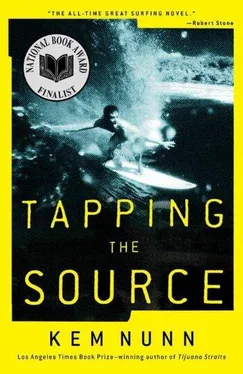
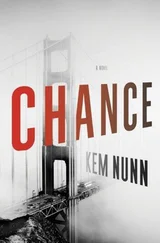





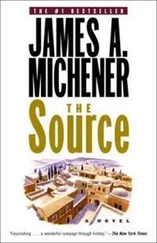
![Джеймс Купер - Пионеры, или У истоков Саскуиханны [The Pioneers, or The sources of the Susquehannah]](/books/395797/dzhejms-kuper-pionery-ili-u-istokov-saskuihanny-t-thumb.webp)
